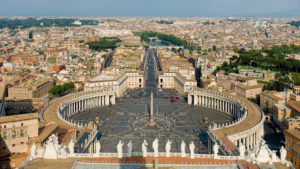On November 24, 2019, Pope Francis delivered a speech on nuclear threats in Nagasaki during a three-day visit to Japan. In doing so, he became the second pope to visit both Hiroshima and Nagasaki, following Pope John Paul II in 1981. In his speech, Pope Francis worried the world has grown content with “a false sense of security sustained by a mentality of fear and mistrust, one that ends up poisoning relationships between peoples and obstructing any form of dialogue. Peace and international stability are incompatible with attempts to build upon the fear of mutual destruction or the threat of total annihilation.” The speech emphasized Pope Francis’ long-standing position on nuclear weapons, reiterating the human need for “security, peace, and stability.” He argued that the lasting damage done by nuclear weapons demonstrates the threat they pose, and thus require participation from all in order to fulfill these fundamental needs. The points made in his speech were aligned with a religious approach to peace called “Just Peace Theory.”
Unlike the often-cited Just War theory, Just Peace focuses on how to avoid war, but applies to all stages of conflict, from conflict prevention, to mediation and conflict resolution, to post-conflict reconstruction. Just Peace promotes nonviolent resistance practices and is focused on addressing the whole of a community and relationships that have suffered from conflict, in an effort to sustainably rebuild beyond tangible infrastructure so that violence does not return. There are principles of Just Peace that are applicable to post-conflict reconstruction, and are demonstrated in Pope Francis’ speech, namely the role of participants.
The Pope called for “involvement on the part of all: individuals, religious communities and civil society, countries that possess nuclear weapons and those that do not, the military and private sectors, and international organizations,” in order to make a world free of nuclear weapons reality. His call correlates with a principle of Just Peace that addresses participation, which states the peace process should be inclusive; expanded to women, youth, and victims of the conflict. Pope Francis explained the response to the threat of nuclear weapons must be “joint and concerted.” He addressed political leaders asking, “not to forget that these weapons cannot protect us from current threats to national and international security,” and suggested that we “ponder the catastrophic impact of their deployment, especially from a humanitarian and environmental standpoint…in order to achieve the goal of an integrated human development.”
The speech was given in the birthplace of Catholicism in Japan, but was not the first time a pope has acknowledged the threat that nuclear weapons pose to the world. The Holy See has denounced the use of nuclear weapons before; Pope John XXIII argued for the ban of nuclear weapons in 1963 stating, “Unless this process of disarmament be thoroughgoing and complete, and reach men’s very souls, it is impossible to stop the arms race, or to reduce armaments, or…ultimately to abolish them entirely.”
But while Popes have mentioned the threat of nuclear weapons in the past, the last several years have seen an increased effort by the Church to address nuclear weapons, including in the creation of the Dicastery for Promoting Integral Human Development. This dicastery is an office of the Roman Curia, the overall administrative offices of the Holy See, and went into effect in 2017. This office recognizes the connections and intersections between nuclear weapons, poverty, the environment and migration.
In Nagasaki, the Pope made clear his concerns declaring, “The arms race wastes precious resources that could be better used to benefit the integral development of peoples and to protect the natural environment.” Additionally, back in September of 2015 during Pope Francis’ first address to the UN General Assembly, he professed, “An ethics and a law based on the threat of mutual destruction and possibly the destruction of all mankind are self-contradictory and an affront to the entire framework of the United Nations.”
While nuclear weapons have not been used in wartime since 1945, the images of their devastating effects and the accounts of survivors should serve as reminders of a line that should never be crossed again. In the eyes of Pope Francis and so many people around the world, “There is a need to break down the climate of distrust that risks leading to a dismantling of the international arms control framework.” As we approach the 75th anniversary of the bombings of Hiroshima and Nagasaki, leaders around the world should take the opportunity to think critically about what the continued existence of nuclear weapons says about humanity.

